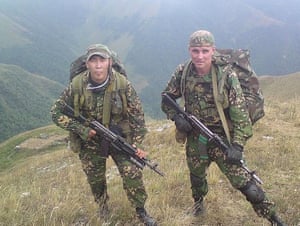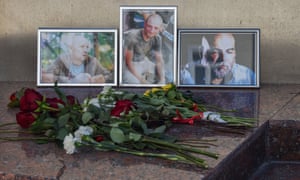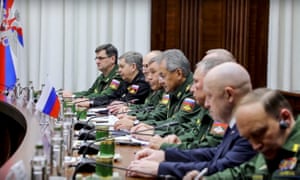When Olga Markelova’s ex-husband Dmitri was killed fighting in Syria in 2017, she expected the Russian government to help provide at least for their daughter, his only child.
After all, Dmitri had served in the army for a decade in hotspots such as Chechnya. Before his death he had signed on with a private military company – his friends told her it was called Wagner – to fight in Ukraine and later Syria. For Olga it was just another military job.
Two years later she is still fighting for compensation. The latest twist came when she was told by officials this year that her husband was not a soldier at all but an employee of a regional subsidiary of an energy company.
Markelova said she knew this was not the case. “I know that he was fighting and he was in this private military company,” she said. “I was there in Krasnodar, I saw the base in Molkino, I saw him in a military uniform. He never hid from us that he was fighting abroad.”
Markelova’s story shines a light on how Russia’s unregulated mercenary industry, a growing element of Russian power projection abroad, can affect families. Death notices can come by text message and bodies can take weeks to be returned home.
“He has one child and there is no one here to help,” Markelova said. “He fought for them. They’ve all forgotten about her.”

Now, as the Russian government seeks to increase its influence in Africa, driven in part by western sanctions imposed in 2014 over the annexation of Crimea from Ukraine, Russian mercenary outfits are expanding on the African continent too.
Central to many of these operations is Wagner, which first emerged on the battlefields of Ukraine. Since then it has grown from a simple paramilitary outfit to providing military training, political consultancy, and intelligence and online influence operations.
In Africa, Wagner’s main role is to provide site security and assist in political operations. Two former fighters said they had heard reports of several colleagues killed in Sudan and of a deadly firefight in the Central African Republic (CAR), but those incidents could not be confirmed.
Wagner’s footprint has been largest in CAR, where its fighters have served as military advisers, trainers and armed guards in exchange for gold and diamond mining concessions. Russian mercenaries also serve as a personal guard to the country’s leader, Faustian-Archange Touadéra. As part of Russia’s broader soft power push into the country, a company tied to the group even financed a beauty contest last year.
In July 2018 three journalists who were investigating Wagner’s activities in CAR were shot and killed by unknown gunmen. Their families declined to speak for this article as the investigation is ongoing.

In Sudan, Wagner mercenaries were first filmed training military personnel to storm buildings in 2017. Mercenaries were also spotted near this year’s anti-government protests, although they were not directly involved in efforts to put them down. Sudan’s capital, Khartoum, is the group’s main entry point into central Africa, and a convoy of military vehicles bearing hundreds of mercenaries was spotted at the border between Sudan and CAR last July.
Leaked documents have shown Wagner’s efforts to make inroads to other countries in Africa by dispatching mercenaries and political consultants. Yevgeny Prigozhin, a businessman linked to the group, was spotted in November at high-level negotiations with Khalifa Haftar, the head of the rebel Libyan National Army, indicating that Russian mercenaries may be helping the his advance on Tripoli.
Ruslan Leviev, the founder of the Conflict Intelligence Team, an open-source investigation unit, said Wagner is “almost like a quasi-governmental machine … It’s hard to just call it a private military company.”

The number of Wagner mercenaries in Africa pales in comparison to the number in Syria. Leviev estimates the group has 150 mercenaries in CAR and several dozen in Sudan, compared with upwards of 2,000 in Syria at the conflict’s peak. The death toll is also far lower. “The goal is different: you’re not storming cities, you’re providing security and intelligence,” he said.
Wagner’s core asset has always been its willingness to send paid mercenaries to places where the Russian government can not openly go. Some operations have ended in disaster. Hundreds of mercenaries, some tied to Wagner, were reportedly killed in clashes with US forces during a doomed attempt to seize an oil refinery in Syria in February 2018.
Wagner promises its recruits it will provide compensation in the event of their death and usually it does, according to former fighters and media reports. Families are generally given about £60,000, sometimes on the same day as the funeral, and are told not to speak to the media.
Markelova and her husband divorced while he was still fighting abroad. When he was killed, compensation was delivered to his mother. They ceased speaking when Markelova went public demanding that Vladimir Putin step in to protect the families of private military contractors. “She wants me to stay quiet,” Markelova said. “But I want to see someone act for us.”
















